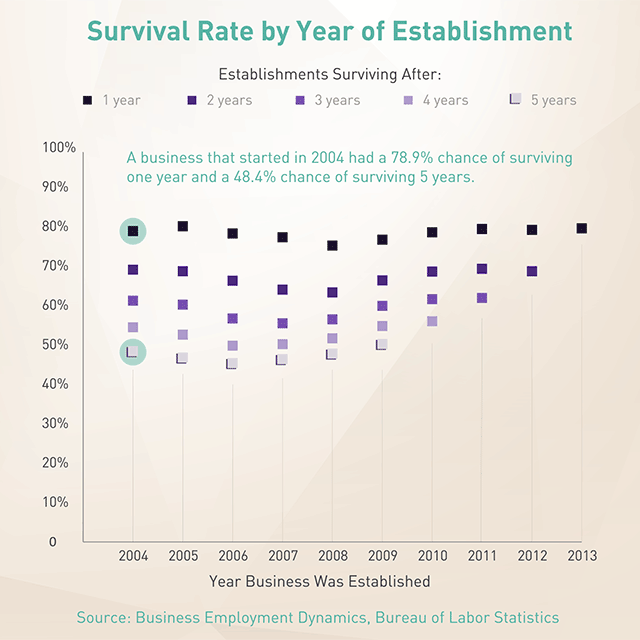— August 4, 2017
There are a hundred questions to ask yourself before you start a business, but there’s one that turns more people away than any other:
What if I fail?
It’s a scary question, for sure. But legitimate. Most businesses do fail. But it’s not quite as bad as some sources say. According to the Bureau of Labor Statistics, a new business has about an 80% of making it in the first year, and about a 50/50 chance of making it to its fifth year.

80% is fairly good odds… unless your retirement and your family home is on the line. Which is why most people are cautious. It may be why you’re still on the fence.
But what about failing?
What actually would happen…. if you failed?
This is easier to answer than most of us want to admit. We just don’t like the answer. If you fail, you’ll probably:
- Be broke, or nearly broke, or in debt (this is tough, but it won’t kill you).
- Be exhausted and emotionally, possibly physically drained (this also sucks, and is not great for your health, but also won’t kill you).
- Be far wiser than you are now.
- Have a slew of skills, experience, and know-how that you don’t have now.
Two of those are not so fun. The other two… well maybe they aren’t fun, but they’re valuable. They have market value. A good failure may well teach you more than you learned in college. So if you do fail, and you end up back in the interview chair, you’ll be a more impressive candidate.
But enough worst case scenarios, okay?
What if you could avoid failure?
Now that you know failure won’t kill you, what if you could take some concrete actions and make some flexible plans that would drastically reduce your likelihood of crashing?
Sound like a good use of time? Sound like a smart thing to do before you borrow tends of thousands of dollars or cash out your 401K, and put months, possibly years of sweat equity into your fragile business idea?
Thought so. So this is what you’re gonna do:
- Understand that just because you’re good at what you do doesn’t mean you’ll be good at running a business.
This is the #1 rude awakening for most new business owners. They think that because they were a superstar … accountant, masseuse, writer, attorney – whatever – that they should just be able to go run their own shop.
The reality is that running a business requires it’s own set of skills. Those skills are very different than the skills you’ve honed becoming a superstar professional.
Succeeding with your business will require you to get good at those new skills – or you’ll both need to get good at outsourcing those parts of your business and you’ll need to have enough cash on hand to outsource those tasks. And when you’re first starting out, cash can be really tight.
So what’s the way around this? Any one of these three tactics will work, but trying all of them is even better:
- Get some training. There are thousands of online courses, communities and resources to learn from. Start spending at least one night a week learning the different aspects of your business – everything from legal and taxes to marketing and client management.
- Use your current job as a training ground. If you’re employed at a company that does what you want to do, try to get moved around to different departments, or at least to understand what your co-workers are doing in those departments.
- Find great resources. Start beating the bushes to find the help you need. At the very least, you’ll probably need to find a great CPA, bookkeeper and designer. According to the WASP 2017 “State of Small Business Report” and the WASP 2017 “Small Business Report – Accounting”those are the most common functions for small businesses to outsource.
- Not knowing what the market really wants.
This may be the most painful type of failure to see. Everything else for the launch works beautifully. Your business model was a homerun on paper. Your fancy business plan proved your success.
But the rollout turns out differently.
You now have a nice shiny new business, with thousands of dollars or equipment… and no one cares.
But you can never really know until you try, right?
Baloney. Anybody who’s been in business knows that you do market testing – rigorous market testing – before you invest a dime. So before you, say, launch a dog bakery, rent a dog bakery cart. Lease a table at the local farmer’s market, and see if you can sell dog cookies there.
In other words, don’t just research your market. Test it. Really test it. Understand its culture. Learn how to speak its language.
Neither of those are lofty, empty words, by the way. Every market has its own culture. You can deviate from it a bit by differentiating yourself, but break conventions too badly and you’re sunk.
There are many upsides to doing this. The best one isn’t just avoiding failure. Good market testing often reveals opportunities you would never, ever see otherwise. For instance, who could have known that the doggie biscuits would kinda fall flat, but that the doggie raw food would fly off the shelves – with a 30% profit margin?
The real secret here, of course, is to know your market. The better you know your market, the less of risk you’re taking.
Knowing a market takes time. And while a full-scale bakery might be your dream, if you start with just a cart (instead of a store) you might still have your retirement savings five years from now.
- Get the financing – or build the cash flow – you’ll need.
This is probably the second most common reason new businesses go under: cash flow. Even if they can get enough financing to start, they often overspend setting up their business, and underestimate how long it will take to see a profit.
That’s a bad combination.
Here’s the most obvious way around this problem: Spend as little as humanly possible when you first launch your business. For example, if you don’t have clients in your office, DO NOT invest in new furniture. Hit up Goodwill instead.
Then figure out how many months, realistically, it will take you to break even and have an operating cash flow. Then save up enough money to operate for twice as many months.
Like the point before, doing this may delay your launch. And also like the point before, doing this – even if it delays your launch – could save you from failure and debt.
Conclusion
Don’t fear starting a business. You don’t have to be among the ones that fail. But you do have to prepare better than the average entrepreneur does. A lot better.
- Be sure you have the skills or the resources to run all aspects of your business – not just the parts you’re good at.
- Don’t just research your market. Test it. Prove your business can work – with real customers – before you invest too heavily. In other words, start small. Fail fast. Pivot accordingly.
- Be a pessimist when you plan what it will cost to start your business, and how much you’ll make. Even if this means you have to wait a few more months (or even another year) before you launch.
What do you think?
Did you ever start a business that failed? Or one that succeeded? What do you wish you had done differently? Leave a comment and tell us.
Business & Finance Articles on Business 2 Community
(31)





